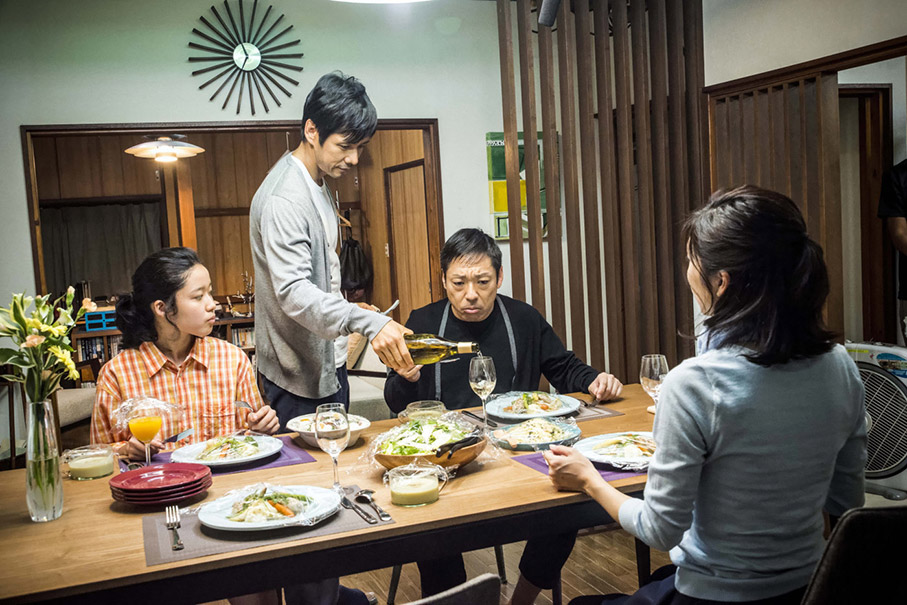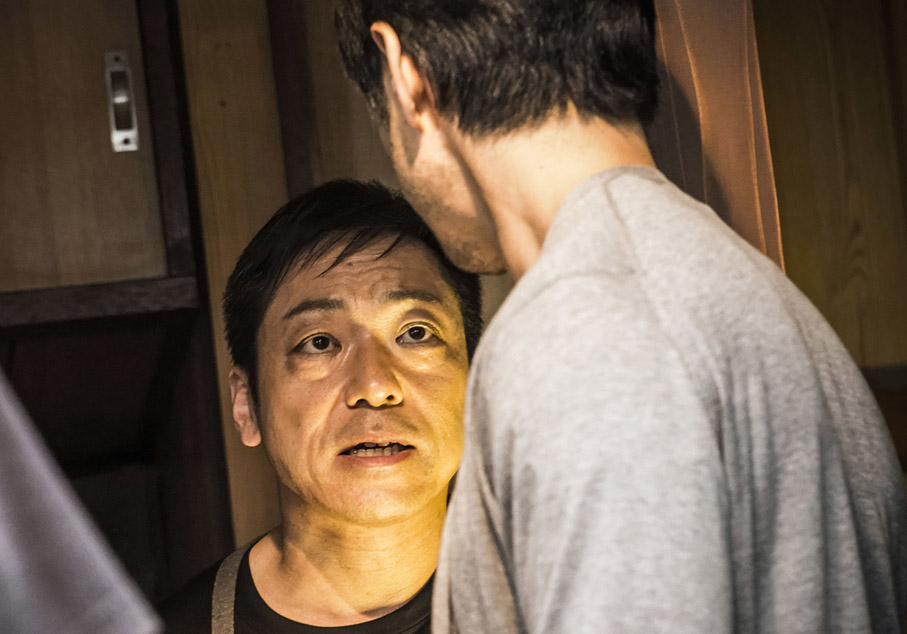|
There's a moment during the arresting opening sequence of Creepy [Kurîpî: Itsuwari no rinjin], the latest film from Cure, Pulse and Tokyo Sonata director Kurosawa Kiyoshi, that suggests we may be watching a supernatural horror. Police psychologist Takakura (Nishijima Hidetoshi) is talking to his younger colleague Nogami (Higashide Masahiro) outside a room in which Matsuoka – a man whom Takakura believes is 'the perfect psychopath' – is being held. As they converse, the door to the room slowly swings open behind them, and when they rush through it there is no sign of Matsuoka and the policeman who was guarding him is unconscious on the floor. But here's the thing – although we saw the door swing open, at no point did we see Matsuoka leave the room through it. It's almost as if he had thrown on a cloak of invisibility. Is he, perhaps, a malevolent spirit in human form? A short while later we're presented with evidence to the contrary when he's cornered with a hostage – as Takakura attempts to convince him to surrender using phrases straight out of the hostage negotiation manual, Matsuoka stabs him in the back and cuts the hostage's throat, then is promptly shot dead by Takakura's colleagues.

Some months later, Takakura has recovered from his injury but retired from the force and taken up a university post in the district to which he and his wife Yasuko (Takeuchi Yûko) have quietly relocated. They do not seem to have picked the most welcoming of streets – two doors down lives a woman who dislikes even talking to others, whilst their immediate neighbour Nishino (Tokyo Sonata's Kagawa Teruyuki) is a bit of an oddball whose manner and behaviour initially give Yasuko the creeps. Takakura, meanwhile, although determined to put his past behind him, still draws on his previous police work for his criminology lectures, and a chance conversation with his colleague Okawa piques his interest in an unsolved case in the region in which a couple and their son disappeared without trace. Unsure why this was categorised as a crime at all, Takakura agrees to accompany the enthusiastic Okawa to the house in which the family lived, and while he chooses not to venture inside the building, something about the location clearly disturbs him. "It feels like a crime scene," he later remarks. A short while later, he is tracked down by Nogami, who has also developed an interest in the case, and while initially reluctant to become more deeply involved, Takakura soon finds himself working with his former colleague on an unofficial investigation into the family's disappearance.
All of this is grippingly handled, as the pull of a mystery whose exact nature is unclear does battle with Takakura's reluctance to revisit the demons of his past. By comparison, Takakura's neighbour Nishino's unpredictable and sometimes troubling behaviour towards Yasuko feels almost a little too on the nose, inviting us to see him as a potential threat some time before Takakura – a former detective with a detailed knowledge of psychopathic behaviour – starts to do likewise. But as the story unfolds, it becomes clear that there will be no moment of sudden revelation about Nishino's true nature, and that tipping the audience off from at an early stage was designed to be a key component of the serious wind-up that Kurosawa unleashes in the film's second half. By the time Takakura is convinced of the threat that Nishino represents, we know he's on the money and thus get to share his frustration at the blocks put in his way and to fear for what Nishino's insidious new friendship with Yasuko might be building up to.

In common with Cure, to which Creepy sometimes feels organically bonded, there are no startling plot twists or sudden bursts of high-octane action, the emphasis instead being on mood and an air of steadily mounting dread. In keeping with this approach, Kurosawa's direction is remains resolutely low-key throughout, favouring static and slowly drifting camera shots over the hand-held waggle-cam of many modern police thrillers. The soundtrack is similarly stripped of overstatement, notably in the use of low-level bass rumbles to underscore scenes that might otherwise lack the aura of menace that sits discomfortingly just beneath the surface.
Creepy is a film that crawled under my skin in the manner of some of the more troubling Korean serial killer thrillers of recent years, a comparison I do not make lightly or without specific reason. There are scenes in its second half that are genuinely unnerving and uncomfortable to watch, and by withholding the specifics of Nishino's psychological and chemical hold on those he targets, Kurosawa makes it discomfortingly easy to swallow, prompting us to be as disturbed by the implications of what is unfolding as we are by what we see. It may not have Cure's allegorical depth and paranormal overtones, but Creepy still sees Kurosawa back on home turf and delivering his most unsettling and darkly compelling film for some time.
Creepy will be screened at the 60th BFI London Film Festival on the following dates:
Saturday 08 October 2015 20:30
Haymarket Cinema, Screen 1
Sunday 09 October 2015 12:30
Vue West End Cinema, Screen 5
The 60th BFI London Film Festival runs from 5th to 16th October 2016.
For further information on the films being screened and to buy tickets for showings, head here:
https://whatson.bfi.org.uk/lff/Online/
The Japanese convention of family name first has been used for all Japanese names in this review
|